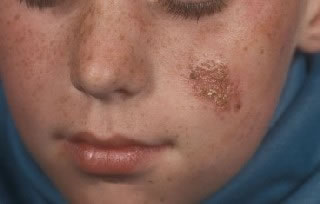Photos

Impetigo of Elbow
This shows impetigo on the elbow. Impetigo is a skin infection caused by bacteria. The infection causes a red sore which leaks fluid. This area will then dry and become crusty as it heals.
Source: Wikimedia Commons
Permission is granted to copy, distribute and/or modify this document under the terms of the GNU Free Documentation License. This is a public domain image file from Wikimedia Commons. Wikimedia is a freely licensed media repository.

Impetigo of Left Cheek
This shows impetigo on the face. Impetigo is a skin infection caused by bacteria. The infection causes a red sores which leak fluid. This area will then dry and become crusty as it heals.
Source: Self Care Decisions, LLC
Used with Permission from Schmitt Pediatric Guidelines LLC.